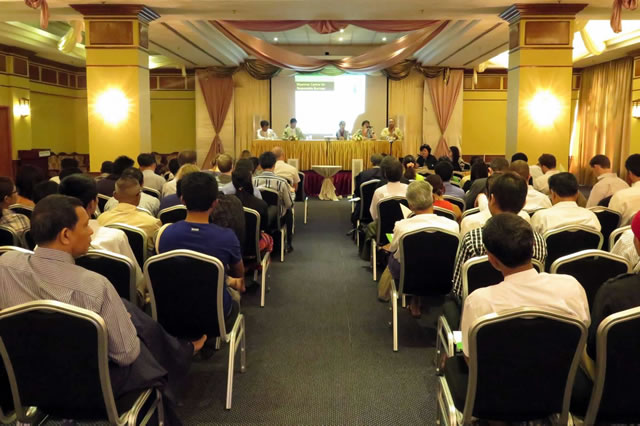Workshop on Environmental and Social Impact Assessment (ESIA) in Myanmar’s Oil & Gas Sector

MCRB today conducted a half-day multistakeholder workshop on environmental and social impact assessments (ESIAs) in Myanmar’s oil & gas sector for approximately 70 participants from Myanmar civil society organisations (CSOs) and companies working in the oil and gas sector in Myanmar.
The aim of the event, following on from MCRB’s oil and gas sector wide impact assessment was to introduce companies and civil society organisations to one another, highlight civil society concerns and to provide an initial introduction to the oil and gas ESIA processs which could help CSOs to engage.
The workshop heard presentations by
Daw Dewi Thant Cyn of Myanmar Green Network and U Maung Tin Thit of Sein Yaung So also spoke about their experiences and civil society priorities.
In the presentation and discussions, the following points were highlighted:-
-
The Environment Management Plan (EMP) which is written as part of the ESIA process is very important for managing significant social and environmental impacts. It is a legal and contractual document, containing commitments which the government should then enforce. The EMP can also be revised as new information becomes available.
-
Where operations in Myanmar already exist (CSOs raised the Myanmar-China pipeline as particular concern), they will have to submit an EMP, even if they had not previously undertaken an impact assessment.
-
Since there is not much reliable baseline data, companies have to conduct impact assessments and adopt EMPs based on assumptions which they must be able to explain and defend. These assumptions may evolve over time and with more information.
-
Civil society participants called for greater transparency and more data regarding companies’ operations, and the ESIA process. Many stressed the need to engage all communities throughout the process. One drew attention to companies who paid lip service to consultation by doing this with hand-picked individuals within the relevant project-area. They also called for more transparency and clarity on the compensation for loss and damage of land. Many farmers continue to complain that they were inadequately compensated.
-
There was widespread acknowledgement that even with an ESIA process and a requirement that companies submit ESIA and EMPs, lack of other legal frameworks and government capacity undermined the effectiveness of both the approval process and enforcement. It would take many years to build this capacity. CSOs encouraged companies not to abuse these gaps and to apply international standards to their operations within Myanmar including their EMPs.
In the afternoon, Emma Irwin, Adviser to the World Bank, presented the Extractives Industries Transparency Initiative (EITI) to extractives companies and provided an update on Myanmar’s EITI candidacy:
Read also
- Rakhine State and Kyaukphyu Communities Want Companies and Government to Coordinate and Consult With Them on Community Development Programmes
- MCRB submits comments on draft Petroleum Bill
- MCRB Submits Comments to the Hluttaw on the Bill concerning Artisanal Oil Production
- Building an Effective EIA Process for Offshore Oil and Gas Operations
- Note of a Meeting on Environmental & Social Standards in the Myanmar Oil and Gas Sector
 English
English မြန်မာ
မြန်မာ မြန်မာ (unicode)
မြန်မာ (unicode)








